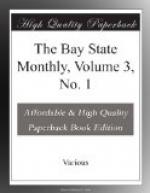Houses, 117 Mills, 6 Acres of orchard, 250 1-2 Acres of mowing, 1834 1-4 Acres of pasture, 2873 1-2 Acres of tillage, 518 1-2 Male slaves, 10 Female slaves, 1 Oxen, 157 Cows, 661 Horses, 207 Sheep and goats, 661 Swine, 251
Value of feeding stock, etc., L431
Decked vessels, tons,
64
Open vessels, tons 68
====
132
Ratable polls,
252
Not ratable, 24
====
276
The tax for that year, assessed on real estate, was L72 16s 6d; on personal estate, L9 14s 11d.
When all who took up the original claims on Allen’s Plain had passed through the vicissitudes of their troubled lives and been numbered with the silent majority in the field of epitaphs, already alluded to, and their descendents were on the eve of the great struggle which was destined to sever them from the mother country, and the hearts of patriotic men began to feel the premonitory throbs of that spirit of independence soon to fire the first shot at Lexington, the Union and Association of Sons of Liberty in the province held a grand celebration in Boston, on the fourteenth of August, 1769. From John Adams’s famous diary we learn that this jovial company, including the leading spirits of the time, first assembled at Liberty Tree, in Boston, where they drank fourteen toasts, and then adjourned to Liberty Tree Tavern, which was none other than Robinson’s Tavern in Dorchester. There under a mammoth tent in an adjacent field long tables were spread, and over three hundred persons sat down to a sumptuous dinner. “Three large pigs were barbecued,” and “forty-five toasts were given on the occasion,” the last of which was, “Strong halters, firm blocks and sharp axes to all such as deserve them.” The toasts were varied with songs of liberty and patriotism by a noted colonial mimic named Balch, and another song composed and sung by Dr. Church. “At five o’clock,” says Mr. Adams, “the Boston people started home, led by Mr. Hancock in his chariot, and to the honour of the Sons, I did not see one person intoxicated.”
* * * * *
HOLLIS STREET CHURCH.
The demolition of Hollis Street Church in this city destroys another old historic land-mark, which, like King’s Chapel, the old State House, and other venerable structures, have a record that endears them to the popular heart. A brief sketch of the three buildings which have successively occupied the site, which is so soon to be left vacant, is worthy of preservation.
The name of the church and the street on which it stood was bestowed in honor of Thomas Hollis, of London, noted for his liberal benefactions; and his nephew of the same name devoted a bell for the edifice, in 1734.




